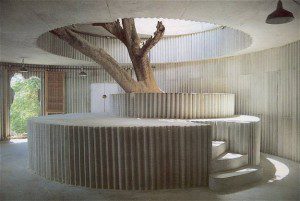Film Review: ‘Precise Poetry’

Louise Bjørnskov Schmidt | 05 January 2015
“I’m an architect! I can’t go through walls! I’m not a witch! All I can do with walls is break them down.” This quote by Lina Bo Bardi is not to be understood literally; Bo Bardi did not break many physical walls since she designed only a few buildings through her career. Still, Bo Bardi is today increasingly recognised as one of the most important architects in the modern history of Brazil. Her ideas and original body of work is now celebrated by Belinda Rukschcio in a new documentary Precise Poetry, released to mark what would have been Bo Bardi’s 100th birthday.
Born in Italy, Bo Bardi represented a minority as a foreigner in Brazil and a woman in the male-dominated profession in the past century. Her position as something of an outsider gave Bo Bardi a self-consciousness that fuelled her political engagement and her interaction with the emerging Brazilian scene of the 1960s. This approach also informs her architectural work along with the sense of anthropological engagement in the cultural and social context of her adopted country.
Rukschcio’s documentary makes clear that Bo Bardi was not just an architect; her writings outweigh her built works, both in number and in significance. Le Corbusier once claimed that “when I can’t build, I draw; when I can’t draw, I write; when I can’t write, I talk” – his idea that any means of communication, drawing, writing or teaching, is to construct, is an idea shared by Bo Bardi and it informed her interaction with the Modern movement. Writing was highly significant to Bo Bardi’s development and provided her with the means to challenge the ideas of Modernism as pursued by the previous generation of Brazilian architects. Through her essays and articles, she proposed new parameters for architectural design.
‘A foreigner. A woman. Different.’ Ana Araujo, curator of the exhibition Lina&Gio: The Last Humanists and teacher at the Architectural Association School of Architecture, is deliberately concise in her introduction of the screening. Bo Bardi’s writings were short but sharp, and her distinctive style characterises her built work, as explained in the documentary by one of her close acquaintances: “When you make a poem, it is precise, and it is perfect. A poem does not have useless words, phrases or verses. And as far as Lina was concerned, architecture should be like this: it should have the precision and conciseness of poetry.”
Precise Poetry takes us on a cinematic journey through Bo Bardi’s most important projects, in the process building an image of her as architect and person. Told in a series of interviews, Bo Bardi’s colleagues and friends recount the socio-political constraints and personal events that lead to the timelessness of her work.
What emerges is a picture of a Bo Bardi’s body of architectural work that celebrates elements such as art and nature, silence and void, which in turn is carried through within the documentary in the content as well as in production. Life, people and nature are portrayed in a poetic narration about the contemporary everyday use of her built projects with the authentic sound of the spaces: the tropical heavy rain falling from the roof of São Paulo Museum of Art on the pedestrians passing by; the performers warming up their vocal chords in Teatro Oficina; the leafs rattling in the wind surrounding the Casa de Vidro (House of Glass); girls talking while wandering the concrete bridges at SESC Pompeia (formerly the Centro de Lazer Fábrica da Pompéia or Pompéia Factory Leisure Centre). Thus, the documentary achieves a powerful evoking of both the simple and sacred dimensions of everyday life through a concise, but powerful form of expression. The documentary itself does not break walls, but it does open doors to the architecture of Bo Bardi.
Precise Poetry/Lina Bo Bardi’s Architecture; Brazil, 2014; Dir Belinda Rukschcio (55 min). Further information available at http://www.precise-poetry.com/
Louise Bjørnskov Schmidt is a Danish architecture-student with one year post part II qualification from Bartlett School of Architecture. Louise currently works at Forbes Massie and is a writer at LOBBY magazine.






